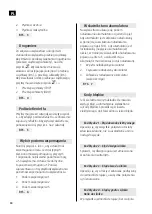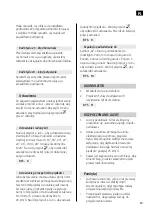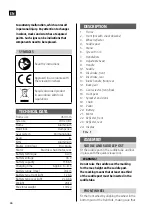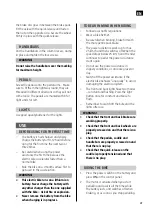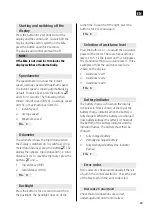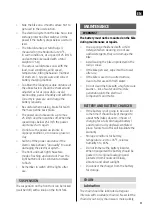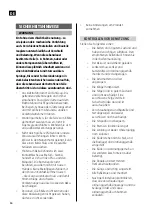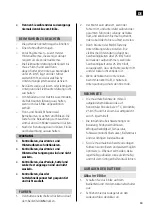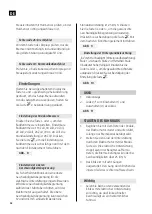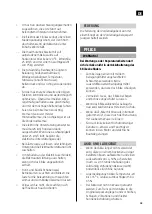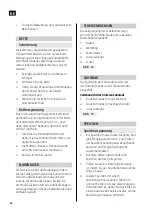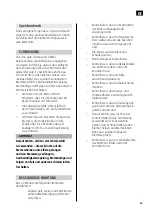
EN
51
• Ride the bike on a smooth surface first to
get used to the acceleration.
• The electrical system on the bike has a low
voltage protection that switches off the
power if the battery drops below a certain
level.
• The total distance per full charge is
measured on the horizontal at 20°C,
in calm conditions, at a speed of 25 km/h
and with the bike loaded with a total
weight of 75 kg.
• The actual real distance varies with the
load, road conditions, wind speed,
temperature, biking behaviour (number
of starts etc.), tyre pressure and correct
battery charging routines.
• To obtain the longest possible distance all
the above factors should be checked and
adjusted as far as is possible – avoid
overloading, pedal smoothly and with the
correct tyre pressure, and charge the
battery regularly.
• Be careful when braking, brake first with
the more gentle back brake.
• The power assistance works up to max
25 km/h and then switches off. When the
speed drops below 25 km/h the power
assistance starts again.
• Do not use the power assistance in
slippery conditions, or on loose gravel or
clay.
• Switch off the power assistance if the
electric bike behaves “unusually” to avoid
damaging the electrical system.
• The front and back lights have two
modes: flashing and constant. Press the
light button once for constant and twice
to flash.
• Remember to switch off the lights after
use.
SUSPENSION
The suspension on the front fork can be locked
(switched off) with a knob on the front fork.
MAINTENANCE
WARNING!
The battery must not be mounted on the bike
during maintenance or repairs.
• Use a sponge moistened with a mild
detergent when cleaning. Do not use
acidic detergents, they can damage the
bike.
• Avoid leaving the bike unprotected in the
rain or snow.
• If the bike gets wet, wipe it with a towel
after use.
• If the bike is used on a salted surface,
clean it after use with fresh water.
• Do not clean the bike with a high-pressure
washer – risk of water and moisture
penetrating into the electrical
components and motor.
BATTERY AND BATTERY CHARGER
• If the battery is not going to be used for
some time it should be kept charged to
about 50% (takes about 2–3 hours of
charging for a fully discharged battery)
and stored in a dry and well-ventilated
place. Failure to do this will invalidate the
warranty.
• Storage conditions for battery:
temperature –20 to +35°C, relative
humidity 5 to 65%.
• Do not immerse the battery in water.
When transported the battery should be
packed in its original packaging and
protected from knocks and blows,
vibration and direct sunlight.
• Disconnect the charger from the battery
for storage.
CHAIN
Lubrication
The chain should be lubricated at regular
intervals with a suitable chain oil. Never let the
chain dry out. A dry chain wears more quickly,


